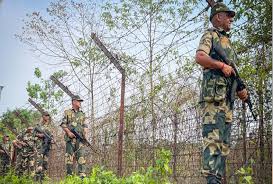
For the seventh consecutive night, Pakistan has violated the ceasefire agreement by resorting to unprovoked small arms firing along the Line of Control (LoC) in Jammu and Kashmir, targeting sectors including Kupwara, Uri, and Akhnoor. The Indian Army responded with equal force, maintaining a firm stance amid growing cross-border hostilities.
The ceasefire breaches come in the wake of heightened tensions following the April 22 terror attack in Pahalgam, which killed several Indian security personnel. The incident has reignited tensions between the two nuclear-armed neighbours, with retaliatory measures being taken by both sides.
Cross-Border Escalation Continues
According to officials, Pakistan’s forces also opened fire along the International Border on Tuesday night, expanding the scale of provocation. The Indian Army, maintaining strict vigilance, responded robustly to contain the situation and protect civilian areas from escalation.
Despite a reaffirmation of the 2003 ceasefire agreement in February 2021, recent developments have strained the fragile peace along the 740-kilometre LoC. The Directors General of Military Operations (DGMOs) of both countries held talks in an attempt to de-escalate the situation. During the communication, Indian officials sternly warned Pakistan against continuing unprovoked firing.
Diplomatic Fallout and International Reactions
In response to Pakistan’s alleged involvement in supporting cross-border terrorism, India has taken a series of punitive actions. On April 23, a day after the Pahalgam terror attack, India suspended the 1960 Indus Waters Treaty, closed the only operational land border crossing at Attari, and downgraded diplomatic relations with Islamabad.
Further escalating the standoff, India shut its airspace to Pakistan-owned and operated airlines and suspended the social media accounts of several Pakistani celebrities. Pakistan retaliated by closing its airspace to Indian carriers and halting all trade with India, including indirect routes through third countries. Additionally, Islamabad rejected India’s suspension of the Indus Waters Treaty, labeling any obstruction of water flow an “act of war.”
International Community Urges Restraint
As tensions mount, U.S. Secretary of State Marco Rubio has urged both India and Pakistan to exercise restraint. In a recent conversation with Indian External Affairs Minister S. Jaishankar, Rubio assured India of Washington’s full support in its fight against terrorism and encouraged diplomatic engagement to prevent further escalation.
India’s Stance
Prime Minister Narendra Modi chaired a high-level security meeting this week, during which he reiterated that India’s armed forces have “complete operational freedom” to determine the nature and scale of its response to terror threats and cross-border aggression.
“The armed forces are fully empowered to take necessary action at a time and place of their choosing,” a senior official quoted the Prime Minister as saying.
With tensions at their peak, all eyes remain on the LoC and diplomatic channels as the region awaits further developments. The situation continues to be closely monitored by the global community, concerned about the rising threat of conflict in South Asia.
Sources By Agencies




